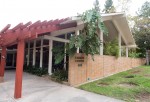This post was updated Aug. 23 at 8:30 a.m.
The UCLA Faculty Center overturned a $300,000 deficit this fiscal year, marking the facility’s first profitable year in a decade, according to the Faculty Center administration.
Established in 1959, the UCLA Faculty Center serves as a meeting place for UCLA researchers, faculty and staff, offering dining and entertainment options throughout the day.
Belinda Tucker, the president of the center’s board of governors, said the center lost $1.7 million since 2010 due to poor management. She said these practices included paying waitstaff full time, wasting uneaten food and having full operating hours during the summer.
“That’s obviously unsustainable,” Tucker said. “We were paying employees during hours that we didn’t have business.”
This deficit-producing business model culminated in a $600,000 deficit in 2015. Then-board of governors president Claudia Mitchell-Kernan, concluded that new management was needed. The board of governors hired Luciano Sautto, the current Faculty Center general manager, in an attempt to reboot the center.
“We needed to find somebody that was going to turn people around,” Tucker said. “We could not have gone another couple of years burning money.”
Sautto said the Faculty Center had been neglected over the years and required cleaning and repairs.
“My purpose the first year was to clean the place up and repair as much as I could that was damaged and really move it forward by introducing new offers,” Sautto said.
Two years later, the Faculty Center is out of the red.
Jane Permaul, treasurer of the board of governors, said staff efficiency reduced deficits, increased business and expanded revenue. The Faculty Center raised its membership dues by one dollar and opened up membership availability to anybody who receives a paycheck from UCLA, except for undergraduate students.
Sautto said improved food offers helped raise revenue as well. The faculty center now includes an a la carte restaurant serving breakfast, lunch and dinner five days a week, a vegetarian bar, buffet and other grab-and-go options.
In addition, faculty conferences, graduation parties, bar mitzvahs and other events held at the Faculty Center grew profits.
“The key revenue in providing food … is providing (a space for) conferences,” Permaul said. “Faculty have conferences and they need a big room and they’re going to have refreshments or a dinner event.”
Sautto said he believes business-hour curtailment is the biggest factor to the revenue change.
“It’s a seasonal business,” Sautto said. “One of the things I noticed in the past was that they weren’t adjusting the purchasing and staffing levels according to the season. For example, when we go into summer, our revenue drops by 50 percent, so we drop our expenses by 50 percent.”
The Faculty Center has been independently financed since it was established. It relies on membership dues, donations and transactions made during business hours for funding. However, the university significantly subsidized some of the faculty center’s costs until about 20 years ago, Permaul said.
“The university has not provided any revenue in recent years, and that’s been a major problem of our finances,” Permaul said.
The Faculty Center and UCLA have a tenant-landlord relationship, solidified by a recent $10 million facility conservation commitment from the university. According to a Faculty Center press release, the university will assume maintenance costs and will invest in renovations.
“In any standard lease, the landlord is responsible for maintaining the facility,” Permaul said.
In addition to the university’s investment in the Faculty Center’s structural upkeep, continued efforts to renovate the building have added to its success.
“Interiorwise, we cleaned it out, we painted it, we brought in new artwork,” Sautto said. “I took down the curtains and you can see from one end of the building to the next.”
Faculty members frequenting the Faculty Center responded positively to transformation endeavors.
Shane Que Hee, an environmental health sciences professor, said he thinks improved organization and culinary options have helped the success of the Faculty Center.
“Having a new chef, a new general manager and increasing prices to the members has been successful,” Hee said.
Sautto said he plans to modernize the Faculty Center further in hopes of continued progress.
“I want to respect the past, the era of the building,” Sautto said. “But (I want to continue) keeping up with today’s trends and ensuring that service is above and beyond and that we continue to be on the cutting edge of food and offers.”
Sautto’s changes haven’t gone unnoticed, and faculty welcome the transformations.
“There was nothing wrong with the mom and pop operations,” said Albert Aubin, campus & community relations chair for the UCLA Retirees’ Association, said. “For any organization on campus to be successful, it has to keep evolving and changing to remain relevant. What’s been happening at the Faculty Center for the past two years, it’s relevant again to the changing demographics of the faculty and staff.”
